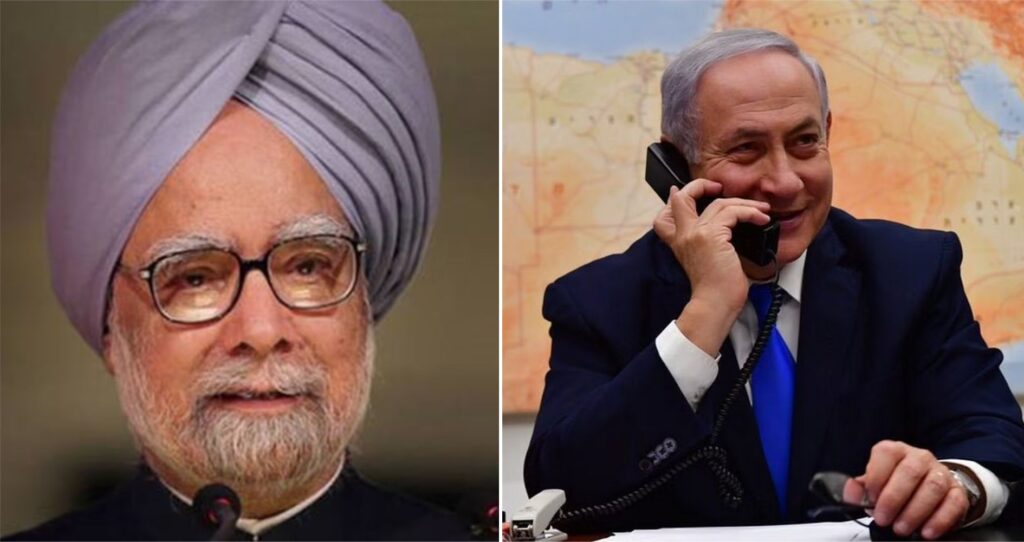by THOMAS L. FRIEDMAN
I am watching the Israel-Hamas war in Gaza today and thinking about one of the world leaders I’ve most admired: Manmohan Singh. He was India’s prime minister in late November 2008, when 10 Pakistani jihadist militants from the Lashkar-e-Taiba group, widely believed to be linked to Pakistan’s military intelligence, infiltrated India and killed more than 160 people in Mumbai, including 61 people at two luxury hotels. What was Singh’s military response to India’s Sept. 11?
He did nothing.
Singh never retaliated militarily against the nation of Pakistan or Lashkar camps in Pakistan. It was a remarkable act of restraint. What was the logic? In his book “Choices: Inside the Making of India’s Foreign Policy,” India’s foreign minister at the time, Shivshankar Menon, explained why, making these key points:
“I myself pressed at that time for immediate visible retaliation” against the jihadist bases or against Pakistani military intelligence, “which was clearly complicit,” Menon wrote. “To have done so would have been emotionally satisfying and gone some way toward erasing the shame of the incompetence that India’s police and security agencies displayed.”
He continued, “But on sober reflection and in hindsight, I now believe that the decision not to retaliate militarily and to concentrate on diplomatic, covert and other means was the right one for that time and place.”
Chief among the reasons, Menon explained, was that any military response would have quickly obscured just how outrageous and terrible the raid on Indian civilians and tourists was; “the fact of a terrorist attack from Pakistan on India with official involvement on the Pakistan side” would have been lost. Once India retaliated, the world would immediately have had what Menon called a “ho-hum reaction.” Just another Pakistani-Indian dust-up — nothing unusual here.
Moreover, Menon wrote, “an Indian attack on Pakistan would have united Pakistan behind the Pakistan Army, which was in increasing domestic disrepute,” and “an attack on Pakistan would also have weakened the civilian government in Pakistan, which had just been elected to power and which sought a much better relationship with India than the Pakistan Army was willing to consider.” He continued, “A war scare, and maybe even a war itself, was exactly what the Pakistan Army wanted to buttress its internal position.”
In addition, he wrote, “a war, even a successful war, would have imposed costs and set back the progress of the Indian economy just when the world economy in November 2008 was in an unprecedented financial crisis.”
In conclusion, said Menon, “by not attacking Pakistan, India was free to pursue all legal and covert means to achieve its goals of bringing the perpetrators to justice, uniting the international community to force consequences on Pakistan for its behavior and to strengthen the likelihood that such an attack would not take place again.”
I understand that Israel is not India — a country of 1.4 billion people, covering a massive territory. The loss of more than 160 people in Mumbai, some of them tourists, was not felt in every home and hamlet, as the deaths, maiming and kidnapping of roughly 1,400 Israelis by Hamas were. Pakistan also has nuclear weapons to deter retaliation.
Nevertheless, it is instructive to reflect on the contrast between India’s response to the Mumbai terrorist attack and Israel’s response to the Hamas slaughter.
After the initial horror at the sheer barbarism of the Hamas onslaught on Israeli children, older adults and a dance party, what happened? The narrative quickly shifted to the brutality of the Israeli counterattack on Gazan civilians, among whom Hamas has embedded itself. The massive Israeli counterstrike overshadowed Hamas’s terror and instead made them heroes to some. It has also forced Israel’s new Arab allies in the Abraham Accords to distance themselves from the Jewish state.
Meanwhile, with some 360,000 reservists called up, Israel’s economy will almost certainly be depressed if Israel’s ouster of Hamas from Gaza requires months, as predicted. It’s already expected to shrink more than 10 percent on an annualized basis for the last three months of the year. This after being ranked by The Economist as the fourth-best-performing economy among O.E.C.D. countries in 2022.
On a personal level, I am appalled by the reaction of those students and progressives who sided with Hamas against Israel — in some cases, even before it retaliated — as if the Jewish people were not entitled to either self-determination or self-defense in any part of their ancestral homeland. This backlash also fails to take into account that Israel, for all its faults, is a multicultural society where almost half of graduating doctors today are Arabs or Druze. Or that Hamas is a militant, Islamist organization that does not tolerate dissent or L.G.B.T.Q. individuals and has been dedicated to wiping the Jewish state off the face of the earth.
So I have sympathy for the terrible choices that Israel’s government faced after the worst slaughter of Jews since the Holocaust. But it was precisely because I closely followed Singh’s unique reaction to the Mumbai terrorist attacks that I immediately advocated a much more targeted, fully thought-through response by Israel. It should have called this Operation Save Our Hostages and focused on capturing and killing the kidnappers of children and grandparents. Every parent could understand that.
Instead, Benjamin Netanyahu’s government immediately raced into a plan to, as Defense Minister Yoav Gallant put it, “wipe out” Hamas “from the face of the earth.” And in three weeks Israel has inflicted easily more than triple the number of civilian casualties and destruction in Gaza that Israel suffered, while committing itself to taking military control of Gaza — an operation, on a relative population basis, that is roughly equivalent to the United States deciding almost overnight to occupy half of Mexico. The Israeli plan, according to Netanyahu, will be a “long and difficult” battle to “destroy the military and governmental capabilities of Hamas and bring the hostages home.”
As I said, Israel is not India, and there is no way that it could be expected to turn the other cheek — not in that neighborhood. But what is Netanyahu’s plan? The Israeli officials I speak with tell me they know two things for sure: Hamas will never again govern Gaza, and Israel will not govern a post-Hamas Gaza. They suggest that they will set up an arrangement similarly seen in parts of the West Bank today, with Palestinians in Gaza administering day-to-day life and Israeli military and Shin Bet security teams providing the muscle behind the scenes.
This is a half-baked plan. Who are these Palestinians who will be enlisted to govern Gaza on Israel’s behalf? What happens the morning after a Palestinian working for Israel in Gaza is found murdered in an alley with a note pinned to his chest: “Traitor,’’ signed “the Hamas underground.”
Moreover, who is going to pay for Israel’s control of, health care for and education of Gaza’s 2.2 million people? Please raise your hand if you think the European Union, the Gulf Arab states or the substantial progressive caucus in the Democratic Party in the U.S. House of Representatives will fund an indefinite Israeli oversight of Gaza — while Netanyahu and his band of Jewish supremacists are pledged to annex the West Bank without equal rights for the Palestinians there. The cost of occupying Gaza could overstretch the Israeli military and economy for years to come.
On top of it all, how is Israel going to manage such a complex operation when there is — for good reason — scant trust in Netanyahu? Just last Saturday he pointed to the heads of Israeli military intelligence and Shin Bet as responsible for missing the Hamas surprise attack while excusing himself of any blame. A day later, an outraged Israeli public forced the prime minister to retract his wartime recriminations against his colleagues. But the damage was done.
Netanyahu does not have a team of rivals supporting him. He has a team of people being asked to make excruciating long-term choices while knowing their prime minister is a person of such low character that he will blame them for everything that goes wrong and hog all credit for anything that goes right.
In sum, dear reader, I understand why Israel believes it needs to destroy Hamas and thereby deter others in the neighborhood from ever contemplating such a thing. But the view from Washington is that Israel’s leadership does not have a viable plan to win or a leader who can navigate the stresses and complexity of this crisis. Israel needs to know the tolerance of its American ally for massive civilian casualties in Gaza in an open-ended military operation is not unlimited. In fact, we may soon be approaching the limit.
Israel should keep the door open for a humanitarian cease-fire and prisoner exchange that will also allow Israel to pause and reflect on exactly where it is going with its rushed Gaza military operation — and the price it could pay over the long haul.
That is why I raise the Indian example. Because targeted use of force with limited, achievable goals may serve Israel’s long-term security and prosperity more than an open-ended war to eradicate Hamas. At least Israel should be asking that question.
Such a pause could also allow the people of Gaza to take stock of what Hamas’s attack on Israel — and Israel’s totally predictable response — has done to their lives, families, homes and businesses. What exactly did Hamas think it was going to accomplish by this war for the people of Gaza, thousands of whom were going to work in Israel every day or exporting agricultural products and other goods across the Gaza-Israel border just a few weeks ago? Hamas has gotten way too much understanding and not enough hard questions.
I want to see Hamas’s leaders come out from their tunnels under hospitals and look their people, and the world’s media, in the eye and tell us all why they thought it was such a great idea to mutilate and kidnap Israeli children and grandmothers and trigger this terrible blowback on the children and grandmothers of their Gaza neighbors — not to mention their own.
I have always believed that you can reduce the Israeli-Palestinian conflict since the early 1900s to one line: conflict, timeout, conflict, timeout, conflict, timeout, conflict, timeout, conflict and timeout. The most important difference between the parties is what they each did during the timeouts.
Israel built an impressive society and economy, even if flawed, and Hamas took nearly all of its resources and built attack tunnels.
Please, Israel, don’t get lost in those tunnels.
Credit: newyork times



























